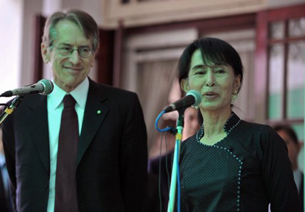Burma: Oath dispute based on 'technicality'
| Publisher | Radio Free Asia |
| Publication Date | 26 April 2012 |
| Cite as | Radio Free Asia, Burma: Oath dispute based on 'technicality', 26 April 2012, available at: https://www.refworld.org/docid/4faa70671a.html [accessed 2 June 2023] |
| Disclaimer | This is not a UNHCR publication. UNHCR is not responsible for, nor does it necessarily endorse, its content. Any views expressed are solely those of the author or publisher and do not necessarily reflect those of UNHCR, the United Nations or its Member States. |
2012-04-26
Aung San Suu Kyi says it will be 'smoothed out soon' and her party will attend Burma's parliament.
 Aung San Suu Kyi speaks to reporters with Giulio Terzi at her residence in Rangoon, April 26, 2012. AFP
Aung San Suu Kyi speaks to reporters with Giulio Terzi at her residence in Rangoon, April 26, 2012. AFP
Burmese opposition leader Aung San Suu Kyi expressed confidence Thursday that she and other elected legislators from her party will be able to take their seats in parliament soon after resolving a "technicality" in a dispute with the authorities over the wording of a loyalty oath.
A clause in the oath for incoming parliamentarians says lawmakers have to "safeguard" the constitution, which officials from Aung San Suu Kyi's National League for Democracy (NLD) say contradicts the policy of the party.
"We think that the present problem can be smoothed over because we'd like to regard it as a technical problem rather than a political one," the Nobel laureate told reporters during a press conference with visiting Italian Foreign Minister Giulio Terzi.
"And we would hope that others would also look upon it this way and not try to push it to the extent that it becomes a political deadlock."
The NLD grabbed 43 of the 44 seats it contested in April 1 by-elections and was initially set to attend the opening of the National Assembly, or parliament, on Monday this week before boycotting the session over the wording of the pledge.
Aung San Suu Kyi said she expects the "problem will be smoothed over without too much difficulty before too long, and that we'll be able to serve our country not just outside parliament – as we have been doing for the last 20 odd years – but also from within the National Assembly."
She was responding to a question about the concerns of some of her supporters who say the NLD is making unnecessary trouble for itself after having only recently come to terms with Burma's new reformist government over the ability to participate in the parliamentary by-elections.
But Aung San Suu Kyi remained firm that the NLD had campaigned on a plan to amend the constitution, on which the oath is based, to eventually remove the military from politics.
"[It is] because we take the promises that we make to people very seriously, that we are trying our best to make sure that whatever we do now is consistent with what we said we would do before the elections," she said.
The constitution was pushed through by the former military junta in 2008. It grants the armed forces a set number of ministerial posts and one-quarter of the seats in both the upper and lower houses of parliament.
Rewarding reform
The decision to allow the opposition party to take part in the parliamentary polls is seen as the latest in a number of reforms, including the release of political prisoners and negotiations with ethnic minority groups, since President Thein Sein's nominally civilian government took power last March.
Those reforms have not gone unnoticed by Western governments which have long held economic and political sanctions in place against Burma based on human rights abuses perpetrated by the country's former military junta.
But the NLD's boycott of the National Assembly, which comes amidst announcements by the United States, the European Union, Australia, and Canada to relax a number of the restrictions based on Burma's measureable democratic reforms, has raised eyebrows internationally.
Terzi's visit came three days after the EU on Monday announced it would suspend trade, economic, and individual sanctions against Burma, which target more than 800 companies and 500 people, for one year before further review, while an arms embargo will remain intact.
Following his meeting with Aung San Suu Kyi, Terzi made clear to reporters that the EU decision to relax restrictions was reviewable and contingent on "irreversible" democratic reform in Burma.
"The suspension of the European sanctions is [based on whether] the democratization will proceed as planned – in an irreversible way," he said.
"We are confident, but we are going to verify in six month's time, and again in a year, where we stand in terms of the democratization process."
Terzi said he had also met earlier with Thein Sein and that the president was "fully aware" sanctions had not been lifted, but only suspended for one year.
He reiterated that the EU wants be sure Burma's reforms "do not stop or even slow down."
On Wednesday, U.S. Assistant Secretary of State for East Asian and Pacific Affairs Kurt Campbell also made clear that Washington had "no intention to lift sanctions" against Burma, noting that recent reforms are both "fragile and reversible."
He stressed that Washington's move to ease sanctions would "actually assist reforms rather than undermine them."
His statement followed the release of a joint letter by nine U.S.-based nongovernmental organizations on Tuesday which highlighted concerns with Washington's plan to lift certain restrictions, saying reform in Burma had not gone far enough and pointing out that basic political power remains with the country's military.
Reported by RFA's Burmese service. Written in English by Joshua Lipes.
Link to original story on RFA website
